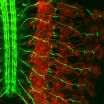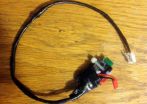(Press-News.org) Writing in PNAS, a University of Manchester physicist has discovered that some games are simply impossible to fully learn, or too complex for the human mind to understand.
Dr Tobias Galla from The University of Manchester and Professor Doyne Farmer from Oxford University and the Santa Fe Institute, ran thousands of simulations of two-player games to see how human behaviour affects their decision-making.
In simple games with a small number of moves, such as Noughts and Crosses the optimal strategy is easy to guess, and the game quickly becomes uninteresting.
However, when games became more complex and when there are a lot of moves, such as in chess, the board game Go or complex card games, the academics argue that players' actions become less rational and that it is hard to find optimal strategies.
This research could also have implications for the financial markets. Many economists base financial predictions of the stock market on equilibrium theory – assuming that traders are infinitely intelligent and rational.
This, the academics argue, is rarely the case and could lead to predictions of how markets react being wildly inaccurate.
Much of traditional game theory, the basis for strategic decision-making, is based on the equilibrium point – players or workers having a deep and perfect knowledge of what they are doing and of what their opponents are doing.
Dr Galla, from the School of Physics and Astronomy, said: "Equilibrium is not always the right thing you should look for in a game."
"In many situations, people do not play equilibrium strategies, instead what they do can look like random or chaotic for a variety of reasons, so it is not always appropriate to base predictions on the equilibrium model."
"With trading on the stock market, for example, you can have thousands of different stock to choose from, and people do not always behave rationally in these situations or they do not have sufficient information to act rationally. This can have a profound effect on how the markets react."
"It could be that we need to drop these conventional game theories and instead use new approaches to predict how people might behave."
Together with a Manchester-based PhD student the pair are looking to expand their study to multi-player games and to cases in which the game itself changes with time, which would be a closer analogy of how financial markets operate.
Preliminary results suggest that as the number of players increases, the chances that equilibrium is reached decrease. Thus for complicated games with many players, such as financial markets, equilibrium is even less likely to be the full story.
### END
The reason we lose at games
2013-01-08
ELSE PRESS RELEASES FROM THIS DATE:
High salt intake linked to social inequalities
2013-01-08
People from low socio-economic positions in Britain eat more salt than the well off, irrespective of where they live, states a paper led by Warwick Medical School published on Tuesday in the BMJ Open journal .
The research was carried out by the World Health Organization Collaborating Centre for Nutrition , based in the Division of Mental Health & Wellbeing of Warwick Medical School at the University of Warwick.
The study looked at the geographical distribution of habitual dietary salt intake in Britain and its association with manual occupations and educational attainments, ...
Modified antibodies trigger immune response, point to novel vaccine design strategies
2013-01-08
CAMBRIDGE, Mass. (January 7, 2013) – In an approach with the potential to aid therapeutic vaccine development, Whitehead Institute scientists have shown that enzymatically modified antibodies can be used to generate highly targeted, potent responses from cells of the immune system.
The approach, referred to as "sortagging," relies on the bacterial enzyme sortase A to modify antibodies to carry various payloads, such as peptides, lipids, fluorophores, and proteins. In this case, the scientists, whose findings are reported online this week in the journal PNAS, attached ...
Untreated Parkinson's disease patients no more likely to have impulse control disorders
2013-01-08
PHILADELPHIA - While approximately one in five Parkinson's disease patients experience impulse control disorder symptoms, the disease itself does not increase the risk of gambling, shopping, or other impulsivity symptoms, according to research from the Perelman School of Medicine at the University of Pennsylvania. A new study is the first to show in a large sample that people with untreated Parkinson's were no more likely to have an increased impulsivity than people without the disease. Published in the January 8, 2013, print issue of Neurology®, the medical journal of ...
Comprehensive public health approach urged to curb gun violence in US
2013-01-08
Boston, MA -- In the wake of the horrific school shootings in Newtown, Conn. in December, three Harvard experts say the best way to curb gun violence in the U.S. is to take a broad public health approach, drawing on proven, evidence-based strategies that have successfully reduced other public health threats like smoking, car crashes, and accidental poisonings.
The authors make the case for a comprehensive public health approach to gun violence in a viewpoint article published online January 7, 2013 in the Journal of the American Medical Association (JAMA).
For instance, ...
Molecular '2-way radio' directs nerve cell branching and connectivity
2013-01-08
Working with fruit flies, Johns Hopkins scientists have decoded the activity of protein signals that let certain nerve cells know when and where to branch so that they reach and connect to their correct muscle targets. The proteins' mammalian counterparts are known to have signaling roles in immunity, nervous system and heart development, and tumor progression, suggesting broad implications for human disease research. A report of the research was published online Nov. 21 in the journal Neuron.
To control muscle movements, fruit flies, like other animals, have a set of ...
UI researcher learns mechanism of hearing is similar to car battery
2013-01-08
University of Iowa biologist Daniel Eberl and his colleagues have shown that one of the mechanisms involved in hearing is similar to the battery in your car.
And if that isn't interesting enough, the UI scientists advanced their knowledge of human hearing by studying a similar auditory system in fruit flies—and by making use of the fruit fly "love song."
To see how the mechanism of hearing resembles a battery, you need to know that the auditory system of the fruit fly contains a protein that functions as a sodium/potassium pump, often called the sodium pump for short, ...
AMSSM issues position statement on sport-related concussions
2013-01-08
Philadelphia, Pa. (January 7, 2013) - Athletes with concussions must be held out of practice or play until all symptoms have resolved, to avoid the risk of further injury during the vulnerable period before the brain has recovered. That's among the key recommendations in the new American Medical Society for Sports Medicine (AMSSM) position statement on concussions in sport, which appears in the January issue of Clinical Journal of Sport Medicine. The journal is published by Lippincott Williams & Wilkins, a part of Wolters Kluwer Health.
At a time of increased concern ...
Penn researchers show new level of control over liquid crystals
2013-01-08
PHILADELPHIA — Directed assembly is a growing field of research in nanotechnology in which scientists and engineers aim to manufacture structures on the smallest scales without having to individually manipulate each component. Rather, they set out precisely defined starting conditions and let the physics and chemistry that govern those components do the rest.
An interdisciplinary team of researchers from the University of Pennsylvania has shown a new way to direct the assembly of liquid crystals, generating small features that spontaneously arrange in arrays based on ...
Computer scientists find vulnerabilities in Cisco VoIP phones
2013-01-08
New York, NY—January 7, 2013—Columbia Engineering's Computer Science PhD candidate Ang Cui and Computer Science Professor Salvatore Stolfo have found serious vulnerabilities in Cisco VoIP (voice over internet protocol) telephones, devices used around the world by a broad range of networked organizations from governments to banks to major corporations, and beyond. In particular, they have discovered troubling security breaches with Cisco's VoIP phone technology. At a recent conference on the security of connected devices, Cui demonstrated how they can easily insert malicious ...
Black and Hispanic patients less likely to complete substance abuse treatment, Penn study shows
2013-01-08
PHILADELPHIA – Roughly half of all black and Hispanic patients who enter publicly funded alcohol treatment programs do not complete treatment, compared to 62 percent of white patients, according to a new study from a team of researchers including the Perelman School of Medicine at the University of Pennsylvania. Comparable disparities were also identified for drug treatment program completion rates. The study, published in the latest issue of Health Affairs, shows that completion disparities among racial groups are likely related to differences in socioeconomic status and, ...



